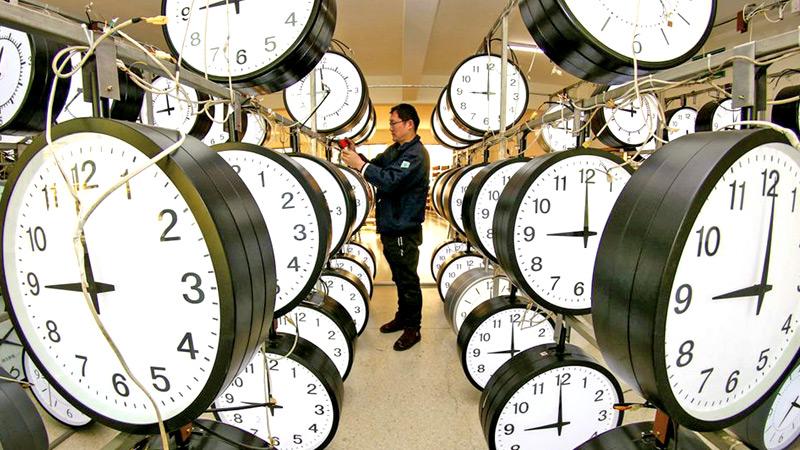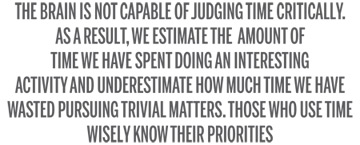
There is a plethora of books written on time management. You may have read some of them and absorbed the salient points. The trouble with time is that it does not stay – it flies! For some people, an hour seems to last forever, for others, it is gone in an instant. Many psychologists have paid close attention to time management. They have identified certain time traps which are like seven deadly sins.
 Time can be looked at from different angles. Some people complain that they have no time to attend to some tasks. There are others who are looking for ways to kill time. Killing time is easy. You can sit under a tree and stare at the clouds forming different patterns for hours on end. Those who complain of non-availability of time should learn the fundamentals of time management.
Time can be looked at from different angles. Some people complain that they have no time to attend to some tasks. There are others who are looking for ways to kill time. Killing time is easy. You can sit under a tree and stare at the clouds forming different patterns for hours on end. Those who complain of non-availability of time should learn the fundamentals of time management.
Time has no favourites. It is very fairly distributed among the rich and the poor. Everyone gets 60 minutes per hour and 24 hours per day. Of course, certain tasks require more time than others. Although there is no inequality in the distribution of time, the day is too short for some people and too long for others.
Math problems
When you go to school, you have to study several subjects, solve math problems, read books, write essays and memorise poems. In addition, you have to participate in sports, debates and educational tours. But no student will ask “How to do all these activities?”
There are, of course, lazy students who want to skip classes and homework. They would stay in bed pretending to be having the flu. However, a clever student does not find the weekly workload intimidating. He knows that all the subjects can be covered and there will be free time as well.
We are quite capable of adjusting time for various commitments. For this, you may not need the services of a time management guru. So, we manage to spend 168 hours a week fruitfully. A recent survey shows that we sleep for 3,020 minutes, spend 2,875 minutes for our jobs and 1,885 minutes on various other tasks such as shopping. With all such activities, we have 2,300 minutes left for our leisure time activities. The figures may vary from person to person.
Sometimes, you will be shocked to find that you have spent too much time watching television or gossiping with your neighbours. Then you will realise that you have only a limited amount of time for important activities. In the workplace, you have to follow a rigid time schedule. Time problems arise outside the working hours. If you are studying for a degree, you will find that you have no time for revision. If you complain of lack of time, you have probably fallen into a time trap. When you are in such a situation, you lose your balance and tend to get angry over trivial matters.
Wasting time
Calvinists and Puritans consider wasting time is one of the worst sins. Even in industrialised countries, you are not expected to waste time because it affects productivity. The more you work, the more you earn and the country will develop economically. Even ancient Greek philosophers advised people not to waste time. They said, “Fill every minute with meaningful activity.”
In the workplace, you are expected to work for eight hours. Sometimes, you may not have enough work to fill eight hours. However, you cannot use the free time for any other useful activity such as reading a book. Parkinson’s First Law, formulated by the British publicist C. Northcote Parkinson, says, “Work expands to fill the time allotted for its completion.” However, if you walk into any Government office, you will see some people idling!
Most people consider free time as a void and try to fill it. For instance, while you are waiting for the arrival of a medical consultant, you lose your temper if he gets late. In private hospitals, those who wait for doctors can watch television. If there is no television to watch or a magazine to read, you will start using your smart phone to relax. It is unfortunate that free time is anathema to many of us.
Insecurity
Some people never say ‘no’ and take on too many responsibilities. They do not do so out of a spontaneous desire to help others. They do so because of their insecurity. You are not expected to comply with every request whether it is pleasant or unpleasant. May be you have a desire to be praised by others. When they come to you with various requests, there is no need for you to accept unnecessary responsibilities simply to please them.
Most students complain that they are not in a mood to study. If you are preparing for an examination, there is no time to wait for moods. Instead, you should follow a well-planned schedule. If you keep on postponing your work, you will be overloaded with constant worries.
When you have a plan, you can find time to relax and enjoy your life. It is a misconceived idea that you can work under pressure. When you plan your work strike a balance between studies and relaxation.
The sense of time can be deceptive at times. Some people get up at a fixed time without the help of an alarm clock. That is a good practice. However, some of them fail when it comes to estimating time intervals. You feel bored when you have to wait in a queue, but when you are with friends you feel the time passes quickly.
Priorities
According to psychologists, the brain is not capable of judging time critically. As a result, we estimate the amount of time we have spent doing an interesting activity and underestimate how much time we have wasted pursuing trivial matters.
Those who use time wisely know their priorities. They are never in a rush because they stick to their decisions. Therefore, instead of saying that you have no time to do some work, change your whole way of life to get tasks accomplished.
There is a story about a girl who owned nothing except time. With the help of her friends, she fought against time thieves. As Michael Ende says, “Life holds one great but quite commonplace mystery shared by each of us. That mystery is time. Calendars and clocks exist to measure time, but that signified little because time is life itself.”
